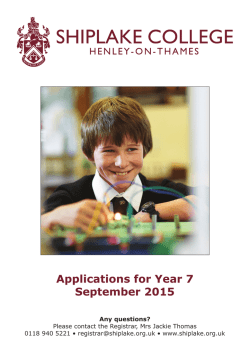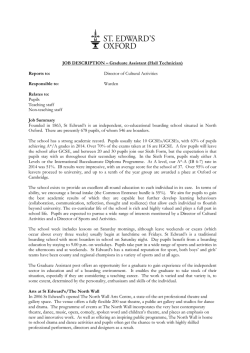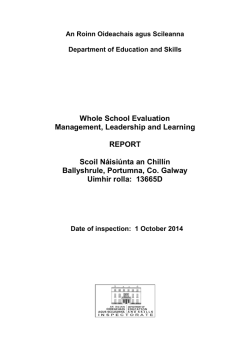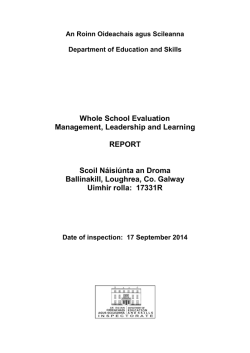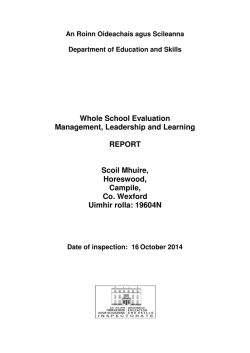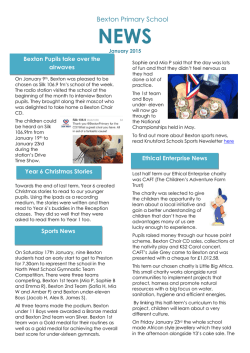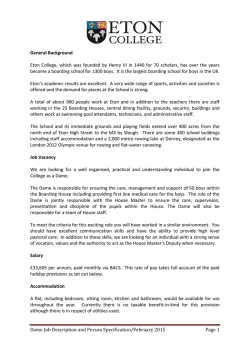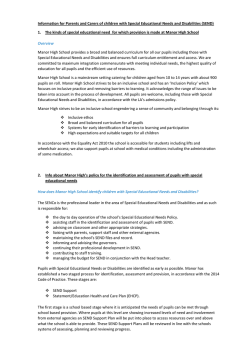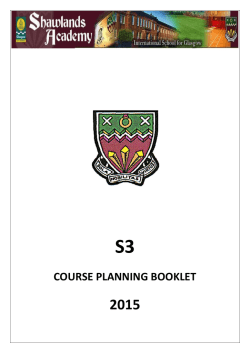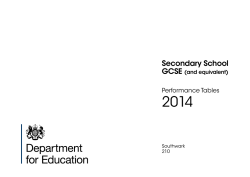
Whole School Evaluation REPORT Mullagh National School
An Roinn Oideachais agus Scileanna Department of Education and Skills Whole School Evaluation REPORT Mullagh National School Mullagh, Co. Clare Uimhir rolla: 03928D Date of inspection: 18 September 2014 1. Introduction Mullagh National School is a co-educational, national school which is located close to the coast in the west of County Clare. It operates under the patronage of the Catholic Bishop of Killaloe and is in included in DEIS, the Department of Education and Skills’ action plan for educational inclusion. There are three mainstream class teachers and three teachers provide learning support and additional teaching support to pupils with special education needs. Sixty-four pupils are enrolled. Their school-attendance rates are very good. At the time of the evaluation, an acting principal was leading the work of the school. The board of management of the school was given an opportunity to comment in writing on the findings and recommendations of the report, and the response of the board will be found in the appendix of this report. A whole-school evaluation was carried out in the school in September 2014. The evaluation focused on the quality of teaching and learning in Irish, English, Mathematics and History. 2. Summary of Findings and Recommendations for Further Development The following are the main strengths of the work of the school: • The overall quality of school management and leadership is very good. • High-quality, well-resourced and spacious school accommodation is provided. • A very affirming and welcoming school climate prevails and the high level of community involvement in the school is a notably positive feature. • The overall quality of teaching is good to very good. • The pupils are confident and expressive and they contribute eagerly to lessons. • Pupils’ achievements in Mathematics are very good with a number of pupils achieving in the very high range. • The school enables pupils to participate in many co-curricular and extra-curricular activities which are of noteworthy benefit to the pupils. The following main recommendations are made: 1 • The school should broaden the range of diagnostic tests being used to inform the plans of work for pupils with special education needs. It should also ensure that learning targets are clear and allow for progression from one period of instruction to the next. • The school should extend its efforts to ensure early intervention and to further promote the development of early literacy and numeracy skills. • To develop aspects of teaching and learning in both languages, the school should provide pupils with further opportunities to engage in independent writing. • Sa Ghaeilge, b’fhiú réimse leathan leabhar a chur ar fáil agus a úsáid. In Irish, providing and using a broad range of books would be worthwhile. 3. Quality of School Management • The work of the board of management is very effective. The board meets regularly and minutes of meetings are carefully maintained. It reports that finances are managed prudently and that annual school accounts are certified. In recent years extensive reconstruction and modernisation of the school building and grounds has been carried out. As a result of its careful and strategic planning, high-quality, well-resourced and spacious school accommodation is provided. The board, school personnel and the local community are highly commended for their combined efforts in this regard. • The board is well informed about overall educational standards and about in-school issues and activities. It takes an active role in policy formulation. It supports pupils and their families in practical ways and it works hard to extend the range of educational experiences for pupils. • It is evident that the school has benefited from effective leadership heretofore and the current principal, who is in an acting role, demonstrates strong capacity to sustain the school’s well established practices and to lead further reviews of school performance. The day-to-day management of the school is very effective. The principal is strongly committed to ensuring effective collaboration and communication between all stakeholders, and in particular, very good home-school communication is noted. All of these factors contribute to an affirming and welcoming school environment. The deputy principal and the special-duties teacher work effectively with the principal. Recently, they have worked hard to promote active lifestyles among the pupils and to review the type and amount of resources used to support teaching and learning. Arising from this, there has been a reduction in the use of text books and workbooks as a means of addressing curriculum content. This has led to greater variety in teaching approaches and reportedly to improved pupil participation and outcomes. • Parents make a constructive contribution to the school through their involvement in a broad range of activities. The pupils are very well managed. They receive regular affirmation and they are rewarded for their achievements at school assemblies. The vast majority of pupils engage in their lessons with enthusiasm and diligence. During the evaluation, questionnaires were issued to all parents and to the pupils in the middle and senior classes. Very positive responses were received, indicating that the parents are very satisfied with the school and that the pupils enjoy their learning and feel safe at school. 4. Quality of School Planning and School Self-evaluation • 2 The quality of whole-school planning is very good. The plans provide good guidance for teachers and help to generate consistency in practices. The mainstream class teachers compile long-term and short-term plans and monthly progress reports. These are of a good quality. In some instances, there is scope at the planning stage to ensure more explicit provision for differentiation. To this end, it is recommended that teachers focus to a greater extent on integrating topics, on outlining alternative content and employing alternative teaching approaches and resources to match the varying needs of a number of pupils. Further collaboration between the support teachers and class teachers would assist in achieving this. 5. • Very good work is being carried out in school self-evaluation. In accordance with the school self-evaluation process, the school is addressing the development of pupils’ reading comprehension skills. This work is progressing well. • Confirmation was provided that the board of management has formally adopted the Child Protection Procedures for Primary and Post-Primary Schools without modification and that the school is compliant with the requirements of the Child Protection Procedures for Primary and Post-Primary Schools. Quality of Teaching, Learning and Pupil Achievement • During the WSE the quality of teaching observed in Mathematics was very good and in English, Irish and History it was consistently good with some aspects of very good practice noted. Lessons are well structured. Facilitated discussions and skillful higherorder questioning encourage a high level of pupil participation. Good teaching resources are made available and the teachers select and use these judiciously. The classroom environments are very attractive and supportive. • The pupils engage in lessons with enthusiasm and diligence and their overall achievement is good to very good. They answer questions confidently; their handwriting is of a high standard and the quality of their work in copies and in projects is very good. In the mainstream classes, pupils’ attainment is regularly assessed and their progress is carefully tracked and monitored from year to year. • Baineann caighdeán maith leis an múinteoireacht, leis an bhfoghlaim agus le gnóthachtáil na ndaltaí sa Ghaeilge. Déanann na hoidí iarrachtaí maithe an teanga a chur chun cinn. Cloiseann agus cleachtann na daltaí an Ghaeilge trí chluichí teanga, rólghlacadh, dhánta agus rainn. Faoin am a shroicheann siad rang a sé, bíonn foclóir cuí ag formhór na ndaltaí agus éiríonn leo abairtí a chumadh agus ceisteanna a chur agus a fhreagairt go muiníneach. Go ginearálta, sonraítear caighdeán maith ina gcuid léitheoireachta agus scríbhneoireachta. D'fhonn cur le scileanna na ndaltaí, b’fhiú réimse leathan leabhar Gaeilge a chur ar fáil agus a úsáid agus béim sa bhreis a chur ar shaorscríbhneoireacht. The standard of teaching, learning and pupil achievement in Irish is good. The teachers make good efforts to promote the language. The pupils hear and practise Irish through language games, role play, poems and rhymes. On reaching sixth class, the majority of pupils have appropriate vocabulary and can compose sentences and pose and answer questions confidently. In general, a good standard is noted in their reading and writing. As a means of developing the pupils’ skills it would be worthwhile to make available and use a wide range of Irish books and to place further emphasis on free writing. • 3 English is well taught. Very good work is undertaken in oral language through a formal oral language programme and through Aistear which is being introduced gradually. Storytelling, role play, rhymes and songs are skilfully incorporated into lessons. The pupils are expressive and they have a good vocabulary. In reading, a very good programme of work is set out to develop early-reading skills. It is recommended that the school introduce a structured programme such as Literacy Lift-Off to enhance pupils’ overall literacy skills. Frequent reading and peer-to-peer reading are encouraged and a good range of materials is available in the school’s well-stocked library. The school has taken initial steps to introduce a formal comprehension development programme. Some pupils would benefit from more systematic teaching of the writing genres and from further opportunities to engage in free writing. Overall, a very good standard is noted in many of the pupils’ writing copies especially in their levels of fluency, accuracy in spelling and in the quality of their handwriting. 6. • Mathematics is very well taught. The teachers pose questions skilfully to prompt thinking and pupils are well challenged. The lessons observed featured a good balance between drill, thorough explanations of concepts and hands-on work. Pupils are encouraged to connect their mathematical knowledge with real-life situations and to apply their skills to practical tasks in the classroom and in the school environment. Information and communication technologies are used to good effect in lessons. Pupils’ achievements in Mathematics are very good with a number of pupils achieving in the very high range of attainment. • History is well taught. Using a good range of visual images, pupils are enabled to make comparisons between the past and present as a foundation for their work in History. Timelines are displayed in each classroom. These are used well to develop the pupils’ concept of sequence and their chronological understanding. By engaging in drama and role play they are enabled to empathise with the lives of people in the past. Through cooperative work, they produce good-quality projects which are displayed in the school environment. Local history is well taught. Field trips are carried out and the pupils recall key facts in good detail. Quality of Support for Pupils • Three teachers provide good-quality support to pupils with special educational needs. Recently, there have been a number of changes in the personnel attached to these roles and as such the team is at an early stage of working together and collaborating with the mainstream class teachers. • The teachers have established good rapports with the pupils. Plans of work have been devised and weekly notes are maintained. The school’s records indicate that the pupils’ parents are consulted regularly and given opportunities to contribute to the plans. While the overall quality of the plans is good, for some pupils, a shorter planning timeframe is recommended and targets should be more clearly defined. Where support is provided for pupils on a continuous basis, the school should ensure that there is greater continuity and progression in the targets outlined. To further clarify the nature and degree of difficulty experienced by pupils, the school should broaden the range of diagnostic tests being used. This will also provide the school with baseline data against which pupils’ progress can be monitored. • During the evaluation, good teaching and learning was observed in group settings and with individual pupils. Appropriate activities were undertaken and the pupils were well engaged in the lessons. The school should give due consideration to pre-teaching concepts to some pupils in support settings. This will boost pupils’ engagement and achievement when topics are subsequently addressed in the mainstream class settings. For the most part, in-class support is working well. This model of support could incorporate programmes which ensure early intervention and promote the development of literacy and numeracy skills. Published January 2015 4 Appendix SCHOOL RESPONSE TO THE REPORT Submitted by the Board of Management 5 Area 1 Observations on the content of the inspection report Cuireann Bord Bainistíochta Scoil Naisiúnta an Mhullaigh fáilte roimh an tuairisc an-dearfach seo faoi imeachtaí na scoile. Is aitheantas agus spreagadh iontach é seo don Bhord agus do Phobal na scoile. The Board of Management of Mullagh N.S. welcomes this very positive report on the school. It is recognition and wonderful encouragement for the staff, B.O.M and school community. The WSE process has been a positive and valuable experience. Area 2 Follow-up actions planned or undertaken since the completion of the inspection activity to implement the findings and recommendations of the inspection. While acknowledging the dedication, commitment and professionalism of the staff and Board of Management of our wonderful school the report also offers solid advice. The Board of Management has considered the WSE recommendations and are currently working together to set targets and to select strategies in order to meet same. 6
© Copyright 2026
